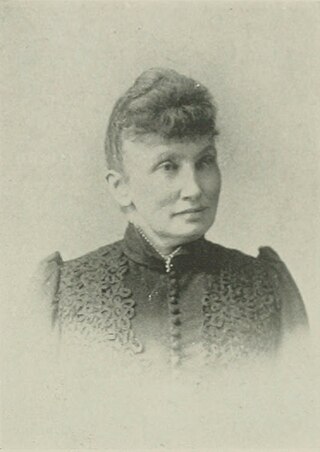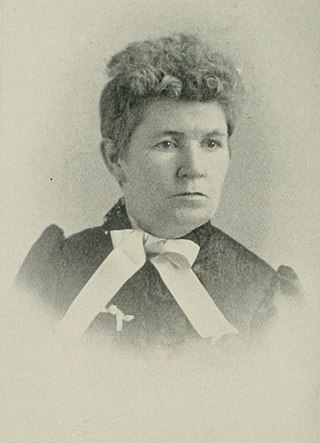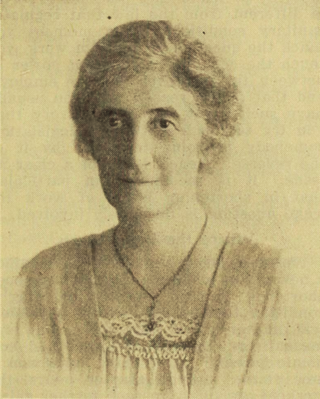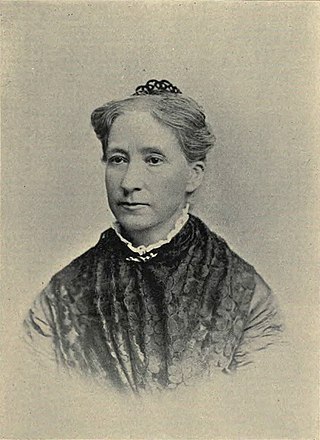Laura A. Moore Westbrook | |
|---|---|
 Laura A. Moore Westbrook | |
| Born | 1859 |
| Died | 1894 |
Laura A. Moore Westbrook (1859-1894) was an American educator, lecturer, and activist. [1]
Laura A. Moore Westbrook | |
|---|---|
 Laura A. Moore Westbrook | |
| Born | 1859 |
| Died | 1894 |
Laura A. Moore Westbrook (1859-1894) was an American educator, lecturer, and activist. [1]
Laura A. Moore was born to enslaved parents Amelia and Richard Moore in Tipton County, Tennessee and likely spent the first several years of her life as an enslaved person. [2] After five years of tutoring from Rachel Alexander, a scholar at Oberlin College, Moore began tutoring other Black girls in her community at only eleven years old. [1] She enrolled at Central Tennessee College in 1872, completing the normal course in 1876 and then, at the urging of her teachers, going on to pursue the school's classical course. She graduated in 1880, the only woman in her class, and later received an A.M. from the same school in 1885. [2] On July 4, 1880, Moore married the Reverend Charles P. Westbrook, one of her classmates at Central Tennessee College. [2] The couple had a daughter named Birdie Lee Westbrook, who was born in 1883. [3]
In December 1880, the Westbrooks moved to Victoria, Texas, where Laura became principal of the Victoria City School and Charles became principal of the Jones Male and Female Institute. Westbrook later joined her husband at the Jones Institute, teaching there for four years. [2] Sometime in the mid-1880s, the couple moved to Waco, Texas, where Laura taught at the W.H. Mission School and served as the second vice president of the Colored Teachers' Institute in McLennan County, Texas. [1] Around 1889, she began teaching in the Waco public school district. During her career as a teacher, Westbrook worked with the advisory board of Texas's 22nd Senatorial District to help secure scholarships and financial aid for Black applicants to Prairie View A&M University (then called Prairie View State Normal Institute), the first state-supported college for African Americans in the United States. [2]
In addition to her work in education, Westbrook was also a social and religious activist. During her time at the W.H. Mission School, she also served as the corresponding secretary for the W.H. Mission Society of West Texas conference, a position she held until at least 1893. She traveled throughout Texas for her mission work, lecturing at Methodist Episcopal churches, and, in 1888, attended a W.H. Mission convention in Boston as a delegate. [2] Westbrook was also a member of the Texas state chapter of the Woman's Christian Temperance Union, which became the first WCTU branch in the South to endorse women's suffrage in 1888. [1] Westbrook drew upon her teaching skills in her work with the WCTU, traveling through the South to speak in support of the temperance cause. Her contemporaries described her lectures as "electrifying and inspiring." [2]
Westbrook died in 1894, at the age of thirty-five. Her cause of death is unknown. [1]

Frances Elizabeth Caroline Willard was an American educator, temperance reformer, and women's suffragist. Willard became the national president of Woman's Christian Temperance Union (WCTU) in 1879 and remained president until her death in 1898. Her influence continued in the next decades, as the Eighteenth and Nineteenth Amendments to the United States Constitution were adopted. Willard developed the slogan "Do Everything" for the WCTU and encouraged members to engage in a broad array of social reforms by lobbying, petitioning, preaching, publishing, and education. During her lifetime, Willard succeeded in raising the age of consent in many states as well as passing labor reforms including the eight-hour work day. Her vision also encompassed prison reform, scientific temperance instruction, Christian socialism, and the global expansion of women's rights.

Mary Hunt was an American activist in the United States temperance movement promoting total abstinence and prohibition of alcohol. She gained the power to accept or reject children's textbooks based on their representation of her views of the danger of alcohol. On her death there were questions asked regarding the finances of the organisation.
The Department of Scientific Temperance Instruction, the educational arm of the Woman’s Christian Temperance Union (WCTU), was an important part of the temperance movement and played a significant role in generating support for prohibition of alcohol in the U.S.

Lillian M. N. Stevens (1843–1914) was an American temperance worker and social reformer, born at Dover, Maine. She helped launch the Maine chapter of the Woman's Christian Temperance Union (W.C.T.U.), served as its president, and was elected president of the National W.C.T.U. after the death of Frances Willard. Stevens also served as Editor-in-chief of the W.C.T.U.'s organ, The Union Signal.

Matilda B. Carse was an Irish-born American businesswoman, social reformer, publisher, and leader of the temperance movement. With Frances E. Willard and Lady Henry Somerset, Carse helped to found the Woman's Christian Temperance Union (WCTU).

Sarepta Myrenda Irish Henry was an American evangelist, temperance reformer, poet and author. She also wrote under the pen name Dina Linwood.

Birdie Alexander was an American educator and music teacher. She was a charter member of the Music Supervisors' National Conference. Alexander is credited with laying the foundations of music education in the Dallas public schools.

Anna Augusta Truitt was an American philanthropist, temperance reformer, and essayist. For many years, she provided services for the Woman's Christian Temperance Union (WCTU), acting as delegate from the local to the district, state and national conventions. Her essays, addresses and reports showed her to be a talented writer. Benevolence was said to be her one underlying character trait.

Julia Colman was an American temperance educator, activist, editor and writer of the long nineteenth century. She served as superintendent of literature in the Woman's Christian Temperance Union (WCTU).

Tsune Watanabe was a Japanese educator. She was president of the Congregational Woman's Missionary Society of Japan and head of the Woman's Christian Temperance Union in Kobe.

Elizabeth Brentnall was an Australian suffragist, temperance activist and philanthropist. She was the first state president (1885–99) then honorary president of the Woman's Christian Temperance Union (WCTU) in Queensland.

Lucy Switzer was an American temperance and suffrage activist. She wrote many articles for Pacific Christian Advocate and the Christian Herald, and was a columnist in Cheney, Spokane County, Washington. She established the women's suffrage movement in eastern Washington Territory.

Missouri H. Stokes was an American social reformer and writer of the long nineteenth century associated with the temperance movement. While working in the missionary field and having charge of the Mission Day School in Atlanta, she found herself drawn into the crusade for temperance after it expanded into the South. In 1880, Stokes became a member of the Atlanta Woman's Christian Temperance Union (WCTU), the first local Union organized in Georgia. In 1881, she became its secretary, and when the State WCTU was organized in 1883, she was appointed State Corresponding Secretary, holding both offices until her resignation in 1893. For years, she was the Georgia Special Correspondent of The Union Signal, and for various papers in her own State, she furnished temperance articles. Stokes was one of the Georgia women to whose efforts the State was largely indebted for the passage of its General Local Option Law and also for its Scientific Instruction in the Public Schools, thousands of petitions for both these measures being sent by Stokes through the post office.

Flora Effie Strout was an American teacher and social reformer. Early on, she taught at Lyman School for Boys in Massachusetts and then at Morgan College, where she also served as principal. As an organizer of the World's Woman's Christian Temperance Union (WCTU), she served as a foreign missionary and temperance movement worker, for three five-year periods in various parts of Asia. She was also involved in the social purity movement and was active in supporting women's suffrage. She wrote occasional articles on temperance issues and the lyrics for Morgan College's school anthem.

Nannie Webb Curtis was an American lecturer and temperance activist, widely-known as a clubwoman. She wrote essays on the topic and edited a magazine. She served as National vice-president of Woman's Christian Temperance Union (WCTU), sat on the National Executive Committee, and was also on the Official Board of the National WCTU, the lawmaking body of organization. Her father having been a Methoidist minister, she made her living lecturing as a pulpit orator on the topics of prohibition and woman suffrage on behalf of the National WCTU, Chautauqua, and the lyceum circuits. Frequently characterized as being "bigger than her state", Curtis was a patriot and a speaker of national fame.

Rosetta Lawson was an American temperance activist, educator, and suffragette. She was, with her husband, educator and activist Jesse Lawson, a co-founder of Frelinghuysen University, where she taught anatomy and physiology. She served for 30 years as a national organizer for the Woman's Christian Temperance Union. Lawson organized the first Congress of Colored Women in the United States, and was elected to the executive committee of the National Association of Colored Women's Clubs.

Lucia Faxon Additon was an American writer, music teacher, and Woman's Christian Temperance Union (WCTU) official. In addition to being a pioneer in WCTU work on the Pacific Coast, she was known as a leader in philanthropic, education, and religious work. Additon was also a clubwoman, being the founder and president of the Woman's Press Club of Oregon, and State chair of Industrial Relations in the Oregon Federation of Woman's Clubs.

Ida A. T. Arms was an American missionary-educator and temperance leader. She served as principal of Concepción College in Concepción, Chile and as president of the Woman's Christian Temperance Union (WCTU) in Chile. Arms translated a number of books from English to Spanish. Her biography was published posthumously.

Susanna M. D. Fry was an American educator and temperance worker. Her teaching career began in the primary department of the village school, but her superior ability as a teacher led her swiftly into positions of greater responsibility. Fry was a professor who held the chair of English literature at Illinois Wesleyan University, Bloomington, Illinois and at the University of Minnesota. She served as president of the Minnesota Woman's Christian Temperance Union (W.C.T.U.), and managing editor of The Union Signal, the organ of the National W.C.T.U. During her career as a professor and as an official of the W.C.T.U., Fry was a frequent speaker in Prohibition campaigns and at temperance conventions. Fry was the only woman chosen from the Methodist church to speak before the Parliament of the World's Religions, 1893.

Mary J. Farnham was a British-born American missionary and temperance advocate. For 20 years, she served as president of the Woman's Christian Temperance Union (W.C.T.U.) of China. As a missionary to Shanghai, Farnham conducted a free day school for poor girls and a large boarding school.